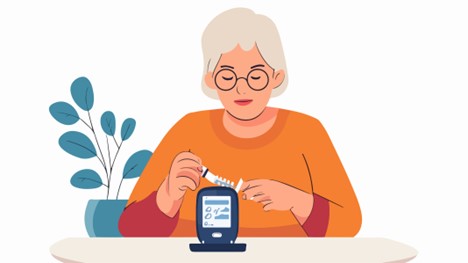In recent years, we’ve seen a rise in diabetes among older adults globally. Managing diabetes in seniors isn’t just about controlling blood sugar. It’s about ensuring they live longer, healthier lives. Whether it’s through regular health check-ups, personalized treatment plans, or a supportive lifestyle, managing diabetes can be straightforward. Here’s how diabetes management in the elderly makes a difference.
Understanding Diabetes Amongst the Elderly Population: A Growing Concern
Diabetes is on the rise among older adults today. In India, nearly a third of seniors live with this condition every day. Across the world, many older people are grappling with similar challenges too. Whether in cities or villages, it’s clear that elderly diabetes care is vital now more than ever.
As we get older, our health needs often change drastically. For seniors, diabetes poses both physical hardships and mental hurdles alike. They may encounter issues such as:
- Slower metabolism can make it tough to manage blood sugar levels.
- Heightened risks exist for heart problems and nerve damage as well.
- Feeling anxious or depressed becomes a common struggle for many. Recognizing these issues helps us focus on managing diabetes in seniors well. By understanding their needs, we can extend more compassionate care and support.
Monitoring, Control, and the Importance of Regular Check-Ups in Diabetes Care
Seniors need to keep an eye on their blood sugar levels daily. Regular checks help them track sudden changes more quickly and easily. This can allow changes in medication if blood sugar isn’t steady enough. Ensuring medicine is taken right on time helps maintain safe sugar levels too. Having a routine supports maintaining a lifestyle that manages diabetes well for older folks.
Discovering diabetes early on can save seniors from many future issues. Frequent health checks let doctors find other health problems sooner than later. The doctor might suggest living changes suited to each senior, allowing better lifestyle fit. Monitoring how current treatment works helps keep everything under control better. Staying ahead with elderly blood sugar control lets seniors avoid many unwanted health troubles early.
Crafting Individualized Diabetes Treatment Plans for Seniors
Every senior with diabetes is unique, each needing personal care. A one-size-fits-all approach doesn’t provide the full picture. Personalized plans take into account:
- The current health conditions seniors have
- Future risks to help plan for emergencies
Creating these plans is key for aging and diabetes management tailored to each senior’s requirements.
In today’s age, technology significantly enhances customized care approaches. Using predictive tools, doctors can:
- Adjust medications to maintain stable blood sugar levels
- Suggest diet changes that avoid unwanted sugar spikes
- Recommend exercise routines that are both safe and effective
These tools simplify diabetes support for older adults, giving them tailored and effective care that meets their unique needs.
Medication Management: Optimizing Drug Plans for Elderly Diabetics
Discovering the right medication for seniors is crucial for their health. Often, older adults begin treatment with drugs like Metformin, which works well.
Each medicine offers benefits but also some side effects to consider. Comparing these medications helps us find out which suits older adults best. This aids in managing blood sugar effectively and safely.
It’s important to be aware of issues like low blood sugar from some treatments. A few might interact with other conditions or drugs the elderly take. Solving these helps reduce complications among older people with diabetes.
Enhancing Longevity and Quality of Life for Elderly Diabetics
Improving life for seniors with diabetes requires focusing on key areas. Seniors need ways to keep their brains active and engaged. Activities like playing cards or doing simple puzzles help the mind stay alert. Diet plays a crucial role when managing diabetes in elderly individuals. A senior diabetes diet focuses on whole grains, vegetables, and lean proteins. These foods are vital in managing blood sugar effectively.
Having a supportive environment is essential for elder care with diabetes. Seniors can benefit from community and family support at home. This support helps maintain their independence and boosts emotional well-being. Access to nearby parks or local recreation centers provides good spaces for exercise.
Conclusion: Pathway to Better Living for Elderly with Diabetes
Managing diabetes in seniors is more than taking pills. It involves a healthy lifestyle for the elderly, focusing on exercise, nutrition, and emotional care. This plan not only extends independence but promotes happiness.
Being proactive is crucial in preventing diabetes issues in older adults. Regular visits to the doctor and blood tests help catch problems early. Early action leads to better health and a longer life, making it easy for aging with diabetes. Also, support networks can improve life quality further.

